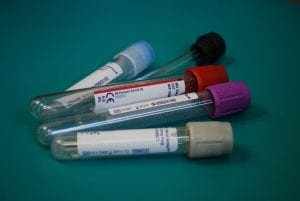Given the unapproved status of testosterone for women in the U.S., it is virtually impossible to track the number of prescriptions dispensed specifically for this purpose.
For the last few years, Shanahan, an ob-gyn in South Lake Tahoe, CA, has prescribed supplemental testosterone (in ointment or pill form) for patients who have experienced a loss of sexual interest with the onset of menopause. These were patients who had not been helped by traditional hormone replacement therapy (HRT).
Of the approximately 70 women who have used the ointment (a 2 percent testosterone solution, applied to the external genitals), about half noticed a significant increase in their sex drive. For those who did not, Shanahan prescribed Estratest (manufactured by Solvay), an oral drug combining estrogen and testosterone.
Shanahan said more women experienced a libido boost from Estratest, which delivers more testosterone than the genital ointment. But a number of women taking the pill also experienced testosterone-related side effects including oily skin, acne and, in a few cases, “aggressive behavior.”
For some patients, the side effects were reason enough to discontinue the drug. One woman who quit Estratest because it made her feel aggressive.
What Can a “Male” Hormone Do for Women?
Testosterone, the primary male sex hormone, has been associated with such archetypal “male” traits as aggressiveness and active libido. Although testosterone is an androgen (male hormone), it also is produced by women, and is, in both sexes, the chief hormone involved in sex drive.
Both men and women manufacture the hormone in their adrenal glands. Men’s testes produce additional testosterone — about 10 times as much — while women release smaller amounts from their ovaries. With menopause, though, the ovaries decrease their production of testosterone.
Even after menopause, most women continue to release enough testosterone from the adrenal glands to maintain an active sex drive. But others experience a gradual or sudden loss of interest in sex.
Hence, some doctors have taken to prescribing testosterone supplements for women even though the practice is still considered controversial in the United States compared to Britain, where it is more common and accepted.
Susan Cruzan, a public affairs spokesperson for the U.S. Food and Drug Administration, said, “There are no testosterone drugs that are FDA-approved for use in women [for the treatment of sexual health].” (Estratest, though not FDA-approved for any indication, is nonetheless on the market, a situation that exists because of “complicated legal reasons,” notes Cruzan.)
For decades now, millions of American women have taken hormones to treat the symptoms of natural menopause or for surgical menopause, which refers to the removal of the ovaries for medical reasons. Typically, HRT consists of supplemental estrogen, sometimes combined with progesterone. In addition to helping protect menopausal women against heart disease and bone loss, HRT has been effective in treating menopause symptoms such as hot flashes, mood swings, sleeplessness, and the range of conditions that can adversely affect a woman’s sex life, including vaginal shrinkage, dryness and loss of elasticity.
Women who have turned a cold shoulder to lovemaking because of intrusive menopause symptoms frequently find relief with HRT. Surveys show that even non-sexual symptoms of menopause, like mood swings and fatigue, can disrupt desire.
Alleviating symptoms like these, as well as the vaginal conditions that can make intercourse more painful than pleasurable, is often enough to restore a woman’s desire for sexual activity. And, according to Theresa L. Crenshaw, MD, estrogen also can help restore a woman’s “receptive” sex drive, making her more responsive to touch and willing to be approached sexually by her partner.
But for women whose loss of sexual interest is not helped by traditional HRT, supplemental testosterone may offer an alternative.
“While estrogen, when used alone, is often enough to maintain normal female well-being, including sexual desire and activity,” writes Crenshaw, “testosterone often needs to be added to ensure robust, dependable sexual desire and response.” Besides boosting sex drive, the hormone can help relieve hot flashes and other conditions related to menopause, and is thus an option for women who cannot tolerate high levels of estrogen.
Because testosterone’s effects in women have not been widely researched, Shanahan said she only prescribes it to patients who have tried estrogen-based HRT without success (and in a few cases, to premenopausal women who were found to have “extremely low” levels of testosterone).
Clearly, the interest is there: When Shanahan appeared last year on TV’s “Oprah” to discuss testosterone’s impact on postmenopausal female libido, the response was enthusiastic. “After that show, women were calling me every day,” Shanahan said.
Pros and Cons of Testosterone for Women
Whether they are willing to prescribe testosterone for women, physicians agree that there is a need for more research on the subject.
“There are anecdotal reports of women helped by testosterone,” said Adam J. Duhl, MD, a gynecologist and instructor in maternal and fetal medicine at Johns Hopkins Medical Institutions in Baltimore. “But we have yet to see any true statistical and clinical evidence that it makes much difference.”
There is also the issue of side effects: Besides aggressiveness and acne, testosterone can cause deepened voice and the growth of facial hair. In addition, said Duhl, it has been shown to lower the rates of HDL, the “good” cholesterol, while increasing heart-harmful LDL cholesterol — “the exact opposite of what estrogen does.” For these reasons, he has never prescribed it.

But many physicians do prescribe testosterone for female libido, and some have been doing so for years.
Since 1986, Victoria Maclin, MD, chief of reproductive endocrinology at the University of Nebraska Medical Center in Omaha, has been providing testosterone to menopausal women who had lost sexual desire and were not helped by estrogen therapy. She administers the hormone by pellets implanted beneath the skin. Maclin said this method produces very few side effects because it employs natural (plant-based) testosterone rather than the synthetic methyltestosterone used in Estratest.
Of the 100-plus women Maclin has treated with this method, only two were unable to tolerate the implant: “It caused irritation, and their bodies expelled it.” The rest, she said, responded well and found themselves feeling sexual again after a hiatus of months or years.
While she considers the implants the best way to deliver testosterone, she knows of no other physician who uses them. “I’m probably in quite a minority,” said Maclin, who discovered the pellets when she took part in a study about their use in women. The pellets’ original, and official, purpose is to provide testosterone to men who have a deficiency of testosterone, but Maclin administers them “off label”, which is the term used when drugs are prescribed for purposes that have not been approved by the FDA.
Adam Levine, MD, formerly an instructor in reproductive endocrinology at Johns Hopkins University School of Medicine and now a gynecologist in Tampa, FL, said that to date, he has prescribed male hormones to about 100 women, with largely positive results. Most of his patients have experienced a rise in libido on testosterone, with some also reporting “an increased sense of well-being.”
For several years, Levine prescribed Estratest, which “worked fairly well” for libido, but caused side effects in a number of patients.
So recently, he began offering “a newer alternative,” DHEA. An androgenic hormone that is produced in the adrenal glands of both sexes (and starts to decline before age 30), DHEA is closely related to testosterone. In fact, the body has the ability to convert DHEA into other hormones, including estrogen and testosterone. The hormone plays an important role in sex drive. Taken as a supplement, it also is said to bolster the immune system and delay the physical signs of aging. But little is known about the long-term effects of taking DHEA.
Because it is weaker than the testosterone used in Estratest, said Levine, DHEA produces fewer side effects but appears to be equally effective in restoring libido. “The problem is that there are very few sources that provide pharmaceutical-grade DHEA,” said Levine. “I know of only one local pharmacy that provides it.” Otherwise, the substance is available through vitamin and health-food stores, where it is difficult to account for the quality.
While Levine advocates the use of androgens to treat flagging female sex drive, he acknowledges that “there is not a lot of solid research in this area.” He still recommends that women who undergo libidinal changes with menopause try estrogen therapy first.
While there is a dearth of comprehensive clinical research — for instance, the NIH has only funded studies on supplemental testosterone for men — several studies on testosterone and women’s libido have appeared in medical journals since 1995. Philip Sarrel, MD, a professor of ob-gyn and of psychiatry at Yale University and an active researcher in this area, published studies in 1998 and 1999 concluding that testosterone-estrogen therapy is far more effective than estrogen alone in increasing “sexual sensation and desire” among postmenopausal women.
Sarrel said women whose sex drive decreased with menopause (and did not respond to estrogen therapy), reported more frequent intercourse, greater interest in sex and increased clitoral sensitivity on testosterone. One study noted that women who received a combination of estrogen and testosterone also experienced less depression and fatigue than those on estrogen alone.
The Future of Testosterone for Women
FDA spokesperson Cruzan acknowledged that there is probably a “huge off-label use of these drugs.” But when asked to estimate how many doctors are prescribing them for female patients nationwide, Cruzan conceded she has no idea. Indeed, given the unapproved status of testosterone for women in the U.S., it is virtually impossible to track the number of prescriptions dispensed specifically for this purpose.


Join the conversation!